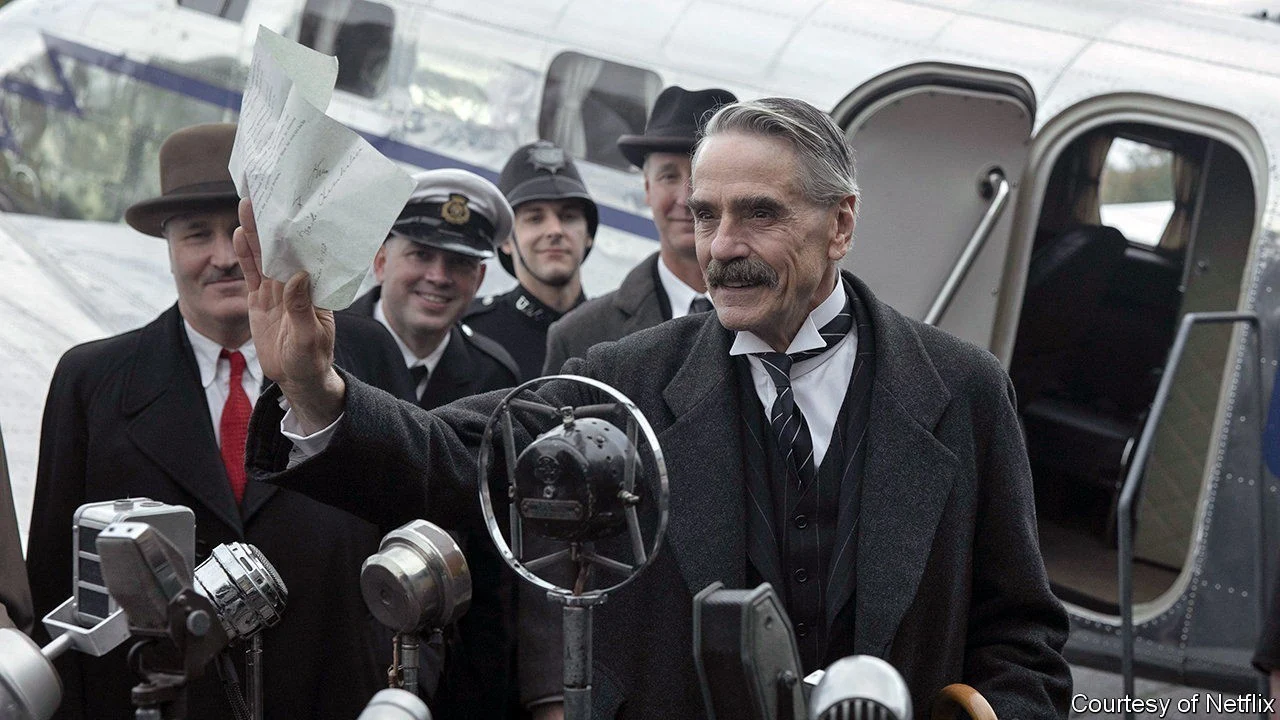
BASED ON ROBERT HARRIS’S novel of 2017, “Munich: The Edge of War” bravely takes on the job of trying to give Neville Chamberlain, one of the most vilified statesmen in history, a makeover. This is no small task. In standard retellings of the second world war, Winston Churchill, his successor as Britain’s wartime prime minister, is lauded as the saviour of his country and quite possibly the world. Churchill is the man who stood up to Nazism; Chamberlain, by contrast, is remembered as Hitler’s patsy, a feeble dupe who handed parts of Czechoslovakia over to Germany at the Munich conference in September 1938 in exchange for empty promises of “peace in our time”.
In so doing, argue Chamberlain’s legions of critics, he merely demonstrated that the West didn’t have the stomach for a fight, thereby inviting more territorial demands from Hitler that ended in war. Ever since, Munich has been as synonymous with surrender as beer halls. A new film goes a little way to redress the balance. Directed by Christian Schwochow, a German film-maker, “Munich: The Edge of War” deftly interweaves fact and fiction to create a taut political thriller. The film’s narrative drive is provided by the relationship between two former Oxford University friends: a buttoned-up Brit, Hugh Legat (played by George MacKay), and a more volatile German, Paul von Hartmann (Jannis Niewöhner). They find themselves at the centre of the action in Munich. Legat is a youthful private secretary to Chamberlain and von Hartmann a junior German foreign ministry official, responsible for briefing Hitler on the foreign press.
But von Hartmann has another reason for getting to Munich. Increasingly convinced that the Führer is driving Germany to disaster, he wants to hand over a secret document to Chamberlain proving Hitler’s territorial ambitions lie well beyond the Sudetenland. His conduit to the prime minister is, of course, his old mucker Legat. Thus ensues an exciting—and entirely fictitious—game of cat-and-mouse as to whether von Hartmann can persuade Chamberlain not to sign the fateful agreement with his own boss.
At the heart of the film, therefore, is Chamberlain himself, portrayed brilliantly and sympathetically by Jeremy Irons. He manages to look and sound almost exactly like his subject without layers of prosthetics and make-up. (Gary Oldman, by contrast, spent four hours in the technician’s chair every day for his Oscar-winning turn as Churchill in “Darkest Hour”.) Remarkably, the film-makers manage to get through the entire two hours without mentioning Churchill once, surely a feat of calculated bravado.
Belying Chamberlain’s reputation for weakness, Mr Irons’s prime minister is much more faithful to the real man: purposeful, energetic and self-confident. He bounds up stairs and dispatches business briskly. He appears to have the stamina at the age of 69 to exhaust most of his advisers, even as the talks with Hitler and the French and Italian leaders drag into the early hours. It is not mentioned in the film, but Chamberlain’s flights to Germany were his first ever, and considered to be something of an ordeal by many.
The film tries to explain why he pursued the doomed policy of appeasement. Utterly convinced that appeasement was the only way of taming Hitler, Chamberlain was happy to cut out any ministers and officials who might tell him otherwise, as is repeatedly and correctly illustrated in the film. “His mind, once made up, [was] hard to change,” wrote Chamberlain’s first biographer, and that was as true of Munich as of any other episode in his life. His real weakness was self-confidence. It was Chamberlain’s idea to get Hitler to sign the scrap of paper pledging eternal peace that he waved around at Heston Aerodrome on his return to Britain. For Chamberlain, this represented the successful conclusion of his policy; Hitler advised anyone who would listen not to take it seriously.
“Munich: The Edge of War” does not so much redeem Chamberlain, therefore, as cast him in a new light. In the end, however, it is still difficult to escape Churchill’s quip that Chamberlain, reared in Birmingham’s local politics, looked at affairs “through the wrong end of a municipal drain pipe”. In the film Legat, for one, is not fooled by Munich. Despite his evident admiration for Chamberlain’s attempts to avoid war, he returns from the conference ready to join the RAF. He warns his wife that war is coming regardless—as indeed it did, within the year.
“Munich: The Edge of War” is streaming on Netflix now
By The Economist




